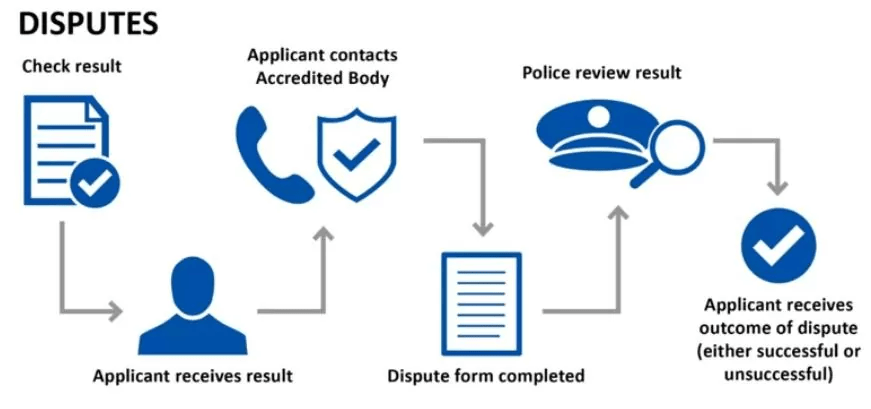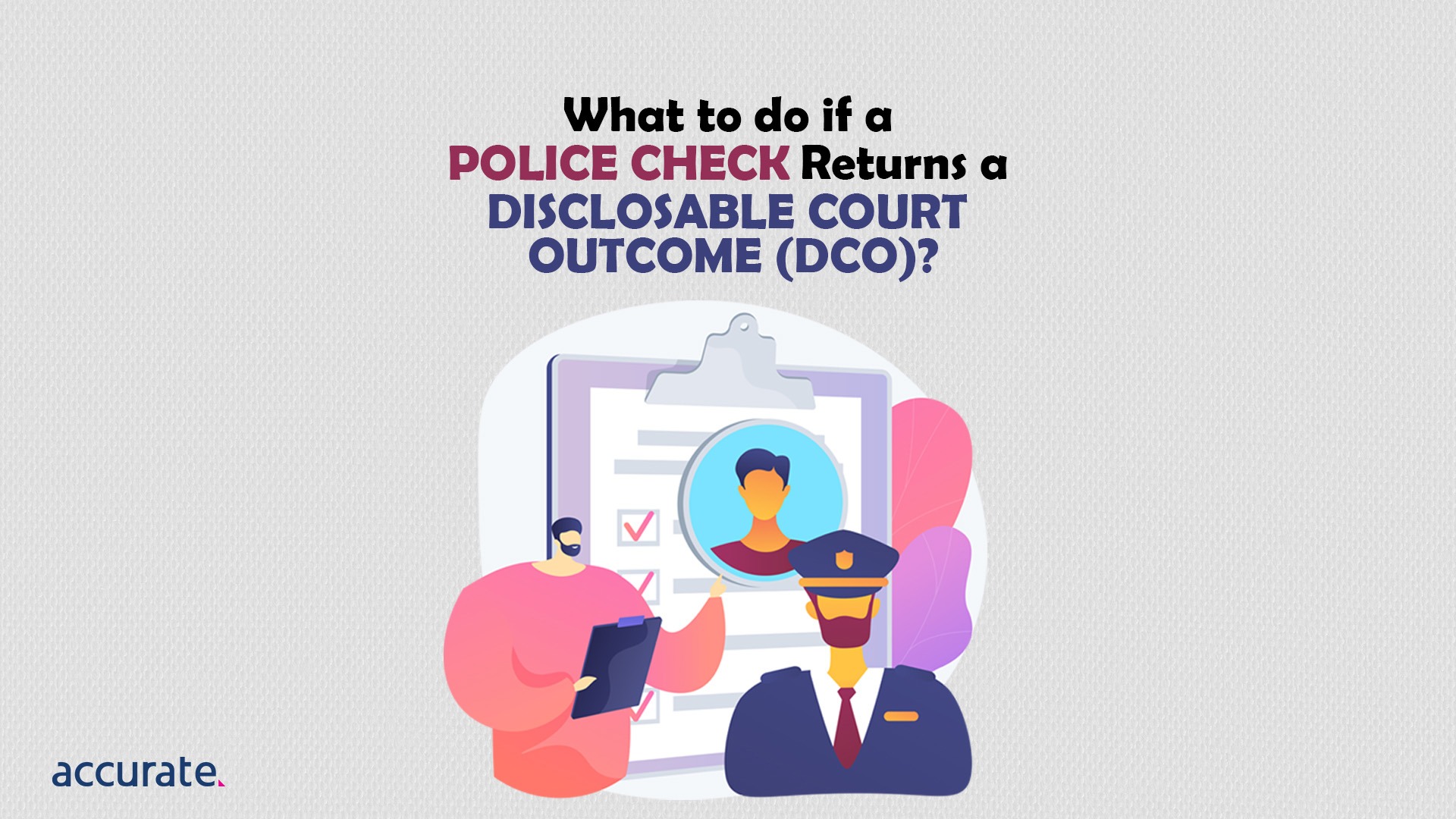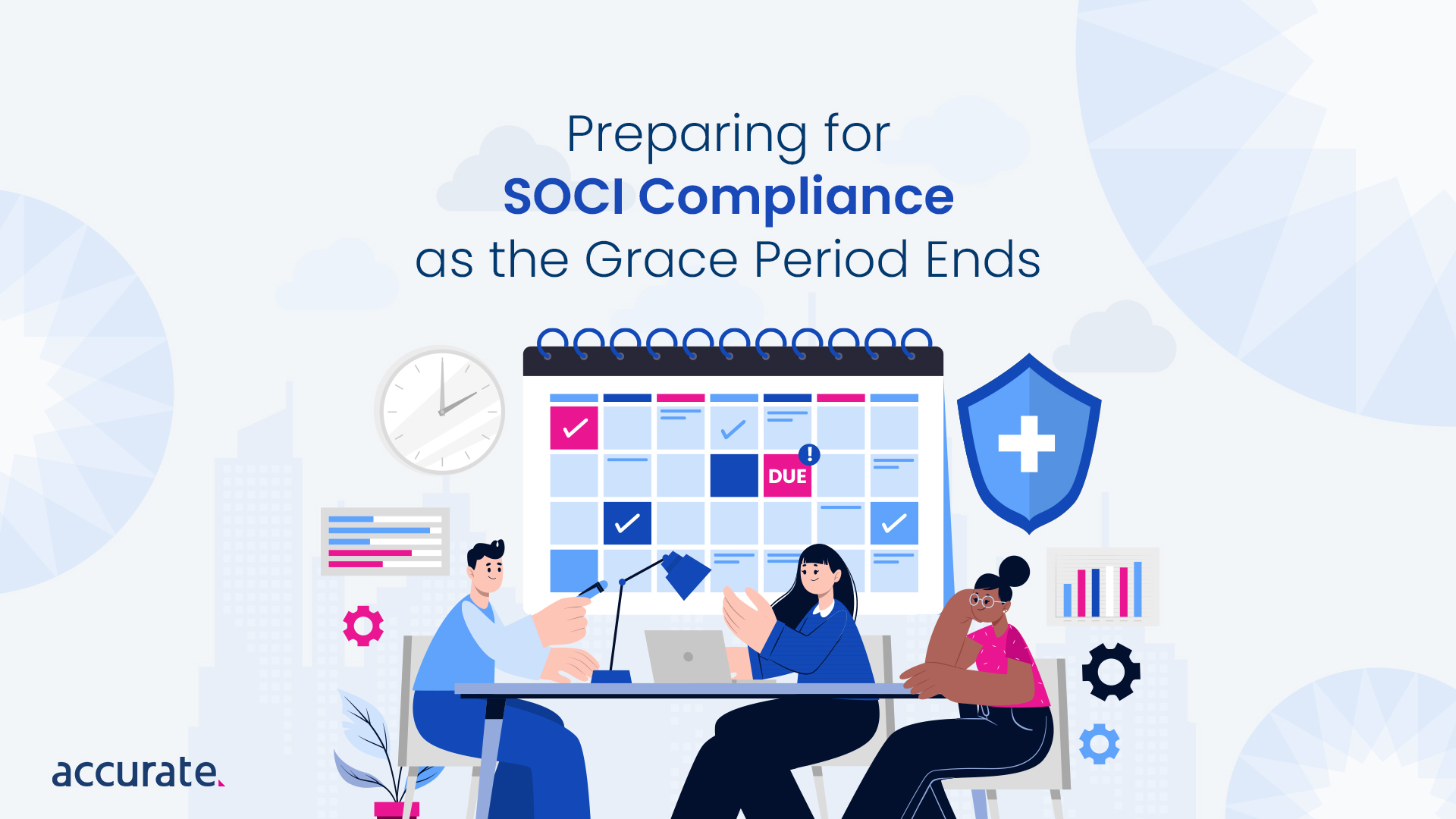As an HR manager, you are responsible for ensuring the safety and well-being of your employees. Part of this involves screening potential candidates to ensure that they are qualified and trustworthy. Police checks are an important tool in this process, as they can help to identify individuals with a history of criminal activity. And, in some cases, a police check may even be required by law.
In Australia, conducting a police check will help you establish whether your potential candidate has any Disclosable Court Outcomes (DCO) or any pending charges against their name.
Now, let’s say you have carried out this screening check and you receive a national police check certificate indicating that your new star recruit does in fact have a Disclosable Court Outcome. In other words, they have some sort of criminal history that meets the threshold for being released to you as an employer.
Now what?
Well, there are a few things you need to consider in this situation and that’s what we’re going to walk you through in this article.
What is the Difference between No Disclosable Court Outcomes and Disclosable Court Outcomes on a Police Check Certificate?
A National Coordinated Criminal History Check allows organisations to request a search of an individual’s criminal history from all Australian police jurisdictions. This includes criminal convictions, charges, sentences and other information that may be held by police agencies.
The Australian Criminal Intelligence Commission (ACIC), along with accredited organisations such as Accurate Background, coordinates these police checks on behalf of organisations and requests relevant police agencies to conduct searches of their records. Once the police have completed their searches, the ACIC collates the results into a certificate.
The certificate outlines if there are Disclosable Court Outcomes or No Disclosable Outcomes.
If there are No Disclosable Outcomes, it means that the recruit either doesn’t have a criminal record or ACIC can’t release any policy checks due to the spent convictions scheme.
You may also be interested in reading: Spent Convictions in Australia: Everything You Need to Know
If the certificate indicates that there is a DCO, it means that the relevant police jurisdictions have been allowed to release relevant information about your recruit’s criminal history. This information can relate to:
- Court convictions (even if no sentence or penalty was given)
- Convictions pending court charges
- Penalties and/or sentences
- Good behaviour bonds and similar court orders
- Charges laid by police but not yet proven, or otherwise, in court.
- Current investigations in which the recruit is a suspect
- Children’s Court convictions and guilty findings
- Traffic convictions and guilty findings
- On-the-spot fines issued by police that ended up in court
What Should You Do If You Receive a DCO on Police Checks?
It can be tricky to know how to handle a DCO result if you haven’t received one before. So, what should you do if this happens to you? The most important thing is to remain objective and follow company guidelines.
Here are three things you should do if your candidate comes back with a criminal record.
1. Provide the Employee an Opportunity To Be Heard
If your candidate’s police check comes back with a DCO, it’s important to give them an opportunity to explain the situation. There may be extenuating circumstances that you weren’t aware of. By having an open and honest discussion, you can get a better understanding of the situation and make a more informed decision.
When a candidate believes that there has been an incorrect release of their criminal history information, they may dispute this with the Australian Criminal Intelligence Commission (ACIC):

Accurate Background can help sumbit this dispute on your behalf.
2. Comply with the Company’s Assessment Criteria
Most companies have pre-determined assessment criteria for candidates with DCOs. These criteria are usually based on the severity of the offence, the time that has passed since the offence took place, and whether the offence is relevant to the position in question.
You should comply with these criteria when making your decision; otherwise, you could be opening yourself up to a discrimination claim (see discussion below).
What Should Your Assessment Criteria Include?
When it comes to assessing the impact of a candidate’s DCO, there are three key areas to look at: the type of offence, when they committed the offence, and whether the offence is relevant to the role they are applying for.
For example, if you’re hiring for a primary school and the DCO is for a serious assault related offences that involves harm of a minor, then it’s very significant. If on the other hand, you’re hiring for a call centre and someone received a traffic violation, you may still feel comfortable hiring them given the circumstances.
Another focus area for your assessment criteria should be mitigating factors such as their “crime-free period” and whether they have made any effort to rehabilitate themselves.
You’ll then need to weigh all of this and the potential impact of the new recruits on your business, both in terms of reputation and in terms of liability.
Ultimately, you should look at each case on an individual basis while taking into account all of the relevant information to make a fair assessment.
3. Consider the Risks Involved
Even if your candidate meets all of the assessment criteria, there’s still a risk involved in hiring someone with an unfavourable DCO. For example, if they’re convicted of a crime while employed by your company, it could reflect negatively on your business. You need to weigh up these risks before making a decision.
Other risks might include:
- Compliance risk: Are there legislative standards which you’re required to follow by not allowing people with certain criminal histories?
- Higher costs associated with replacement and re-hiring: If a dishonest individual is hired without being subjected to background checks, the employer could end up paying more money in the long run if they need to replace that employee down the line due to non-compliance or illegal activities.
- Reputational damage: A business’ reputation can be significantly damaged by negative press if it turns out that an employee has been convicted of a criminal offence and had not been properly vetted prior to being hired by the organisation. This could lead to customers perceiving the business as untrustworthy and losing confidence in their services and products, resulting in financial losses for the company.
- Customer safety: Violent crimes may signal potential for future violent acts.
- Lack of trust between colleagues: If one individual holds a conviction that wasn’t discovered until after they were employed, this can create suspicion amongst existing employees about other new hires – creating an atmosphere of mistrust within the workplace and damaging team morale.
- Heightened security risks: By not undertaking appropriate background checks during recruitment processes, organisations are opening themselves up to greater security vulnerabilities as individuals with malicious intent will be more likely to gain access into premises or systems which should otherwise have been blocked off by tighter controls in place.
4. Remember Important Legal Considerations
In Australia, it is against the law to discriminate against someone based on their criminal record. This means that employers cannot refuse to hire someone simply because they have a criminal record.
In fact, some states and territories such as Tasmania and the Northern Territory have codified laws that expressly prohibit this kind of discrimination. These laws help to ensure that individuals with criminal records are not automatically excluded from the job market – so that they’re able to compete for jobs on a level playing field.
If you’re unsure about whether or not you can refuse to hire an applicant based on their criminal record, the best course of action is to consult with your lawyer. They will be able to advise you on your potential liability and help you make the best decision for your business.
You may also be interested in reading: Background Checks: Legal Considerations
Key Takeaways
It’s always best to err on the side of caution when it comes to hiring employees. You want to make sure that you’re doing everything you can to protect your business, and that includes running background checks such as police checks on potential candidates.
While a candidate’s criminal record might not be an indicator of their job performance, it’s still important to consider when making a hiring decision. In some cases, a criminal record might indicate a risk to the company, or it might raise questions about the candidate’s character. In other cases, the criminal record might simply reflect a minor offence that is acceptable within the company’s policy.
So, when your police check comes back with a Disclosable Court Outcome you should assess it in accordance with your workplace policies and procedures, and make sure to take into account the context of the criminal offence.
And if you would like to engage the services of a third-party screening agency to help you navigate police checks and Disclosable Court Outcomes, get in touch today.



